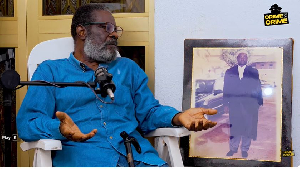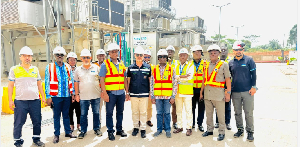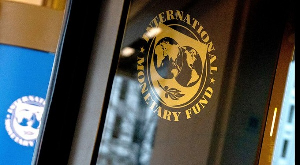Ministry Of Food And Agriculture Workers
Agriculture has been the main stay of the Ghanaian economy. Traditional agriculture provides for food security, supply of raw materials for industry, creation of employment and generation of foreign exchange earnings. Beyond these, agriculture is also recognized to have a greater impact on poverty reduction than any other sectors in developing countries. Other roles are social stabilization, buffer during economic shocks, support to environmental sustainability, and cultural values associated with farming.
Currently, the Ghanaian agriculture sector contributes 34.7 percent to the country’s Gross Domestic Product (GDP), employs close to 60 percent of the labour force and generates more than 55 percent foreign exchange earnings (Ministry of Finance, 2008).
However the agriculture sector is bedeviled with a lot of problems at the farmer level, production and the Ministry of Food and Agriculture level. One major problem of the Ministry of Food and Agriculture is the poor conditions of service in relation to the work. Hence how relieved was the workers of the ministry when the SSPP was introduced by Government. One notable expectation was not salary but FWSC recognizing the peculiar skills of the ministry and its importance to the economy of the country. Workers of the ministry expected CLOGSAG to bargain for a market premium for them. However CLOGSAG and FWSC have made it unequivocally clear that the ministry worker with scarce skills do not deserve market premium.
Quoting Wednesday March 21, 2012 daily graphic “Market premium, according to the Government White Paper on the SSSS, is the monetary incentive paid to attract and retain critical skills in short supply within the economy. It is to bring the salaries of skills in short supply to be close or equal to the actual market value of such skills, with the rationale of enabling the public services to compete favourably for such skills with the private sector”
Readers, the question are “Can government competes with the NGOs and other private sector employers for agricultural skills even in public institution like COCOBOD? Are agricultural skills not short in supply in Ghana?
Ministry of Food and Agriculture is one of the few ministries that employ elites with different skills of profession. I would have like to discuss the skills and expertise of these professionals who in the eyes of FWSC and CLOGSAG do not deserve market premium because they don’t fall in the criteria for market premium. The quantum of skills in the ministry cannot be discussed in this article hence allow me to discuss only one directorate under the Ministry. The directorate is Plant Protection and Regulatory Services Directorate (PPRSD).
Workers of PPRSD undertake the following: training and providing comprehensive diagnostic and identification of plant pests and diseases; monitors pest situation in the country; ensures effective control of plant pests, manages pests outbreak; technical backstopping on identification of crop pests; registration of seed growers; monitoring of seed and planting material production and crop species; certification of seeds meant for export and also primary and secondary planting materials; training of seed inspectors; registered seed growers, seed dealers and NGOs; registration of importers, import outlets, export outlets, registration, inspection and training on pesticides and fertilizer management; issues phytosanitary certificates and import permits of agricultural commodities; undertake marketing quality standards of fresh fruits and vegetables for export and training on export requirements.
This is the general activities of only one directorate which also includes administrative work that is not spelt out. The workers of this department are at our ports, harbours and all borders and inland executing their duties. In addition they generate income for government from their activities. Exporters of agricultural commodities e.g pineapple,pepper,mango,pawpaw, voacangua, griffonia etc without this department your products can never be exported out of the country.
Readers, this represents the working framework of only one department in the ministry. What about the Crop Services Directorate, Department of Agricultural Extension, Veterinary Services Department, Policy Planning Monitoring and Evaluation Department, Animal Services Directorate and other Technical Directorates.
My follow readers and the good people of Ghana, can anybody perform such functions discussed without much training and expertise? How many people in Ghana have such expertise? Are the skills abundant or scarce? Yet CLOGSAG and FWSC tell us we do not deserve market premium because we do not fall into the category for market premium.
My colleagues and follow readers, have you thought of the risk involve by undertaking agricultural activities especially in the field and forests? Agricultural field workers are at the risk of handling poisonous agricultural chemicals like insecticides and pesticides, snake bites and diseases like anthrax, African swine fever, bird flu, brucellosis and other zoonotic diseases. Yet FWSC and CLOGSAG tell us we do not deserve market premium.
Currently the Agric Extension Agent to Farmer ratio in Ghana is very outpouring. A district like Bremang Esikumah has as low as six (6) station agricultural extension officers in the district instead of (32) thirty two required. Compare six extension officers to the number of farmers in the district which is about 70% of the population. I can say with authority the same problem is everywhere in Ghana. The problem is further complicated with majority of the remaining agricultural extension workers due to pension by next 5-7 years. The young energetic trained extension workers are not willing to join the Ministry of Food and Agriculture because of poor remuneration and conditions of service and even those who join just used the opportunity as stepping stone to upgrade themselves and move out than to stay. The young that graduate from the agricultural colleges and universities joined COCOBOD, cocoa marketing companies, banks and other NGOs than join MOFA. The experience ones have joined the exodus from MOFA to COCOBOD just because of one obvious reason. In the midst of these problems, FWSC and CLOGSAG tell MOFA workers you do not deserve market premium?
Readers let us asked ourselves these simple questions and after that you will know whether agricultural expertise is limited in the country as compared to the percentage of farmers in Ghana. The questions include;
I. How many agricultural colleges are in Ghana compared to other professional colleges
II. How many people are willing to enter agricultural colleges compared to other professional colleges?
III. How many agricultural workers are willing to stay in the Ministry when given the opportunity with COCOBOD or other agricultural institutions and organizations?
IV. What is the number of students in our Universities undertaking agriculture courses though our part of the world job is predominantly agriculture?
V. How many of the agriculture undergraduate students in our Universities really applied to undertake agriculture course.
Again, readers, how many district agricultural workers change their clothes in their wardrobe monthly because of our dealings with animals in kraals, pens, slaughter houses, bushes and farms? How many of you are given clothing allowance because of the nature of our work? Don’t you deserve it? Or FWSC and CLOGSAG want to tell us we should use our monies to buy those protective clothing’s? You use your already meager salary to purchase these clothing’s only to be thrown away as a result of undertaking your honourious duty. Yet CLOGSAG and FWSC tells you, you don’t deserve it hence be quiet?
Again, the Ministry of Food and Agriculture workers especially extension agents work in areas where most professionals who are taking market premium and retention allowance will refuse to accept postings not to talk of entering farms and forests of these villages. Agricultural workers in these areas apart from sacrificing their professional and career development also suffer from lack or inadequate drinking water, no electricity, no health facilities and even your own family not willing to stay with you in these areas but for the love of the work, farmers and mother Ghana they perform their duties credibly. Yet FWSC and CLOGSAG tell us we don’t deserve market premium.
To the general public, if these conditions exist in a ministry and yet salary structure that is supposes to attract and retain talents did not solve any of such of these problems. Then if and when you are good parent allow your ward to undertake agriculture science at the secondary, agricultural college and the University with the aim of working in the ministry.
To follow colleagues, who are already in the hot sit; should we continue to keep quiet and let this happened to us? Come to think of it, associations made up of only people with common skills had market premium and retention premium and are even asking for more. Think of GRNA, POTAG, UTAG, FUSSAG, TEWU, and GNAT and even within the ministry of Food and Agriculture is Ghana Veterinary Medical Association. All these associations have been to secure market premium for their members. In as much we continue to allow CLOGSAG to bargain for us, we never get what we deserve as the ministry that holds the Ghanaian economy.
There is a need to for an association made up of agricultural workers in the Ministry of Food and Agriculture alone that will help to negotiate for better conditions of service and retain the work of the ministry to its status as an attractive career choice not by chance or coercion.
BY: Richard Kwasi Bannor (bannor46@yahoo.com)
Tel: 0243524843
Opinions of Friday, 23 March 2012
Columnist: Bannor, Richard Kwasi














